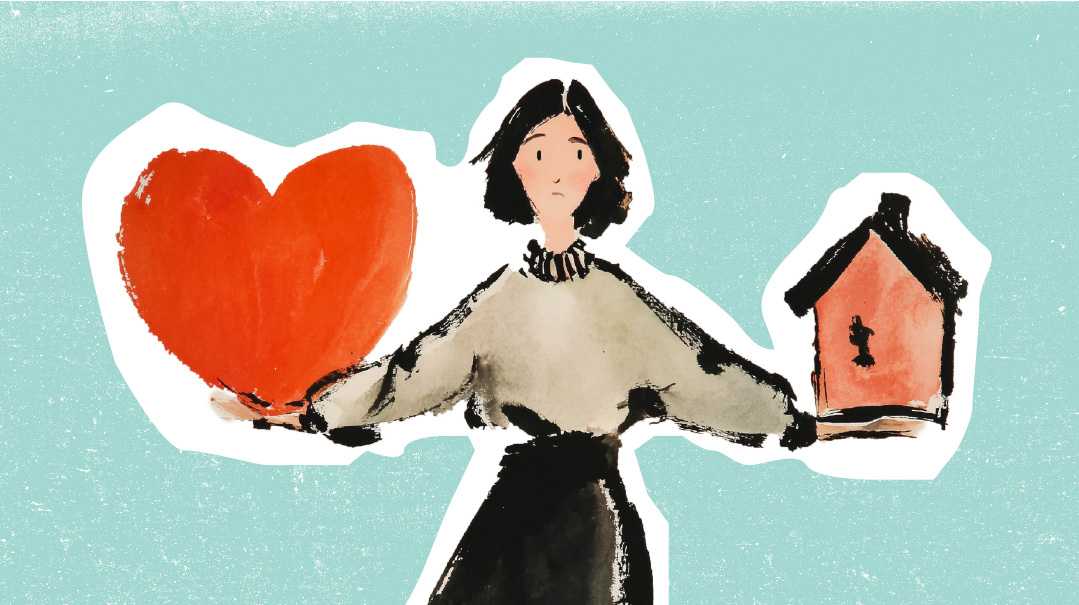Out of the Box

Is conformity a Torah value?

Facilitated by Faigy Peritzman
Q:
I’ve always been an out-of-the-box person. I enjoy dressing in bold colors with zany jewelry, and have little patience with what I call social “silliness.” I grew up in a small community and when I graduated I got certification to be a medical clown, which I love. Baruch Hashem, I recently got married to a man who appreciates me. We moved to a larger community and here’s where the issues seem to begin. It feels like everyone dresses the same and has the same “type” of job (my mother-in-law actually thought my job was a hobby and was appalled I would continue it after marriage.) I even got gentle mussar from another young married in my apartment complex who said that even if I didn’t care to be so different, my future children may, and it’s worth it for me to conform to social norms.
I’m feeling so conflicted. Why can’t I be who I am? Is this my problem or society’s?
What’s the Price?
by Ruchi Koval
The short answer to this question is: It’s your problem if you let it be your problem.
The truth is that every choice we make in life has a price tag. Sometimes that price tag will be worth paying, and sometimes it won’t. The sad reality is that in our communities, there sometimes is, indeed, a price to be paid for individuality.
Some people may be wary of you and your family, and some parents might not want their kids to play at your house. Shidduchim, that scary ghost that exacerbates any preexisting fears about conformity, may indeed be affected by nonconformity.
That’s all true and that’s okay. Because there is also a price to be paid for not expressing your individuality. What is that price? Is it worth paying? Will you feel like a piece of your essential self is in hiding? Will you deprive yourself of experiences that you love? That can take a real toll on someone who thrives on the whole cornucopia of experiences Hashem has given us to enjoy in this world. To me, conformity for you sounds like it will come at a heavy price.
I myself am somewhat of an unconventional specimen of frum society. I never had patience for all the unwritten rules. And then, Hashem, in His ultimate sense of humor, pushed me even further down the unconventional road: My family is super unconventional, through no choice of my own. Each of my kids has taken their own path, and so the option of conformity wasn’t available to me.
What I found in shidduchim was that our family’s diversity was a filter. Families who were open-minded and accepting found their way to ours. Families who were fearful of something different stayed away.
And guess what? That’s perfect. Because rejection is Hashem’s redirection.
“Be more of yourself, so those who are looking for you can find you.” —Popular saying
Ruchi Koval is a kiruv rebbetzin, parent coach, author, public speaker, mother, and grandmother.
A Delicate Balance
by Shevi Samet
There are two very similar but distinct concepts in Torah thought: shalom and achdus. They’re often used interchangeably, but they’re not the same. Shalom comes from the root of shleimus — the harmonious combination of distinct parts forming a whole. Take a sandwich. There are multiple layers, and each layer is distinguishable from the next, but they’re delicious together. Still, if you’re missing a layer, you’ll notice the loss. Cultivating shalom means appreciating people’s differences and how their differences bring out the best in me and vice versa.
Achdus, on the other hand, is the concept that when we remove our external differences, our essence is made of the same core. Let’s use the analogy of a snowflake. I bet you were told in kindergarten that each snowflake is unique. If you took a handful of snow, you’d be holding hundreds of unique snowflakes. But you can’t see them distinctly, and when they melt, all you have is a puddle. No more individual flakes. Because they’re all made of the same material — water. On a neshamah level, we’re each made up of the same matter: as expressions of Hashem, a tzelem Elokim.
We need an understanding of both of these concepts. We are part of a greater whole and our individuation contributes to the harmonious interplay of Klal Yisrael. And fundamentally you and I share a sameness that unites us. It’s normal that there will be a tension between these two ideas; a desire to be a part of something bigger than me and a desire to be uniquely me. Finding the intersection between both is like a man finding balance in knowing his tefillos are valuable and there’s a potency in the minyan’s tefillah that he cannot replicate alone.
This should be your litmus test when questioning your personal standards vis-à-vis the community’s. Are your differences separating you from the values of the whole, or are they expressing your uniqueness and what you contribute to the whole? It’s a balance that needs to inform all your decisions. We need shalom and we need achdus, and we’re tasked with achieving both.
Shevi Samet is a wife and mother, educator, kallah teacher, and Core MMC.
Uniformity vs. Conformity
by Elisheva Kaminetsky
I
hear two parts to your dilemma: one in the present and the other in the future. Often, people confuse the concept of unity with conformity. When Chazal emphasize the importance of unity and achdus, such as “k’ish echad b’lev echad,” they’re referring to our united focus on serving Hashem, and His centrality in our lives.
Yet throughout Torah we see many different ways to serve Hashem. When the shevatim gathered around Yaakov’s deathbed, he blessed each son based on his unique kochos. Each had his own derech, yet each was contributing to Klal Yisrael as a whole. Thus, each of the shevatim was represented by a colorful flag with their unique symbol.
In Alei Shur, Rav Wolbe notes that the creation of man was different from all other creations. All other creations were brought into This World en masse. The world was suddenly full of loads of fish. On another day, there were trees all over. Yet when Hashem created humans, it was one at a time. This shows us that each person is a once-in-a-lifetime creation with his own unique tafkid. Therefore, says Rav Wolbe, it’s ridiculous for anybody to look over their shoulder at another person’s style or derech in avodas Hashem and wonder if that should be their own.
I applaud you that you’ve recognized your flair and zest for life and have embarked on a career in which you’re sharing that simchah with others l’Sheim Shamayim.
B’ezras Hashem, you and your husband will bring children into This World, each of whom will have their own kochos. And it’ll be part of your role as a parent to give them the same confidence to discover their unique place and unique contributions they’ve been brought into This World to make.
Teach your children to have the confidence to be their unique self among other people, united in their focus and drive to serve Hashem. If you’re able to convey that message, they’ll be quite proud to be your children, and have the confidence to be themselves as well.
Elisheva Kaminetsky is a wife, parent, grandparent, principal, adult educator, consultant, and kallah teacher.
(Originally featured in Family First, Issue 941)
Oops! We could not locate your form.







